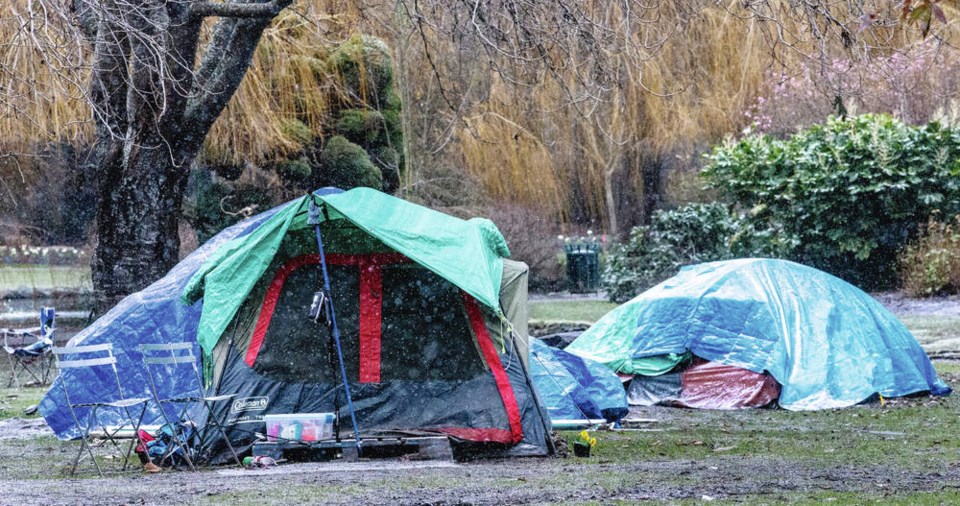Ed Wojczynski couldn’t find his wallet anywhere.
He’d cycled downtown with a friend, popped into a shop on lower Johnson Street, reached for his money and … gone.
“I looked in the store. I looked up and down the street.”
Nothing.
Bummer. It wasn’t just the cash, maybe $200. It was the hassle of cancelling his credit cards. That was two Fridays ago.
The next morning, Wojczynski heard a knock at his Oak Bay door. He opened it to find a bushy-looking guy, big beard and wild hair, maybe 60 years old, draped in a hefty coat and backpack. Homeless.
“Are you Mr. Wojczynski?” the man asked.
“Yes.”
“Here’s your wallet,” the man said, handing it over. Then he turned on his heel and left.
Hold on, Wojczynski said, digging out some cash as a reward. Turns out the man had found the wallet at Johnson and Wharf. Another street guy had suggested returning it minus the 200 bucks, but this fellow said no, that wouldn’t be right and delivered it with contents intact.
“I was totally stunned,” Wojczynski says. “It was reaffirming to have somebody, anybody, return the wallet to me.” It was also a relief not to have to replace his driver’s licence and other bits.
It was only after the man had disappeared from view that Wojczynski began wondering more about him. Had the fellow walked all the way to Oak Bay? “I didn’t think to ask his name. I didn’t think to ask how he was going to get home. I regret not doing both of those things.” Wojczynski jumped in his car to look for the man, but couldn’t find him.
So that’s why Wojczynski and his wife, Diane McGifford, decided to top up their regular monthly donation to Our Place, adding a note explaining that they were doing so in the man’s honour.
Wojczynski has also been telling the story to anyone who will listen. “I really like the idea that this was counter-stereotypical.”
Our Place’s communications director, Grant McKenzie, likes the tale for the same reason. It bucks the tide of anxiety and resentment that has risen in concert with the highly visible spread of homelessness. “It has been tough, because there has been a lot of negativity around camping in parks,” he says.
Can’t argue with that. The spread of tent cities and the subsequent conversion of hotels into shelters, accompanied by a never-ending stream of stories of street crime and anti-social behaviour, have left an impression of seemingly incorrigible dysfunction. Out come the broad brushes.
In truth, you can find examples to fit whatever stereotype you like. Take Wojczynski and McGifford, who arrived here six years ago from Winnipeg, where he had been an engineer and she a New Democrat cabinet minister. They give regularly to a range of charities, including Our Place. When a poor man walks across the city to return a wallet intact, that validates their choices.
Likewise, if homelessness conjures up an image of disturbing public behaviour, there’s plenty of that, too. At noon hour Friday, Fort Street pedestrians slalomed around an angry, ranting man on the sidewalk, doing their best to pretend he wasn’t there.
Pick a stereotype, chances are you can find someone who fits. This week, McKenzie found himself talking to a woman who was beside herself with joy to be out of a tent and into a hotel room that felt like a portal back into the world. But he also knew that if he banged on a neighbouring door, he might find someone whose addiction had led him to pawn the TV.
And if he wandered outside, he’d find a homeless woman who had been robbed of her sleeping bag, the only thing she owned; people on the street are particularly vulnerable to crime.
“It’s not like they’ve chosen this way of life,” McKenzie says. It’s miserable in the cold. It’s frightening to have severe, untreated mental illness. Some days his colleagues take people desperately in need of care to the hospital. “An hour later they’re back at Our Place, because they’ve been dismissed.”
Many people would prefer it if all this were hidden away. As it is, visibility is a double-edged sword, McKenzie says. “It gets people nervous and anxious, but that visibility is also what gets government jumping into action.” It can also feed whichever stereotype you choose.



